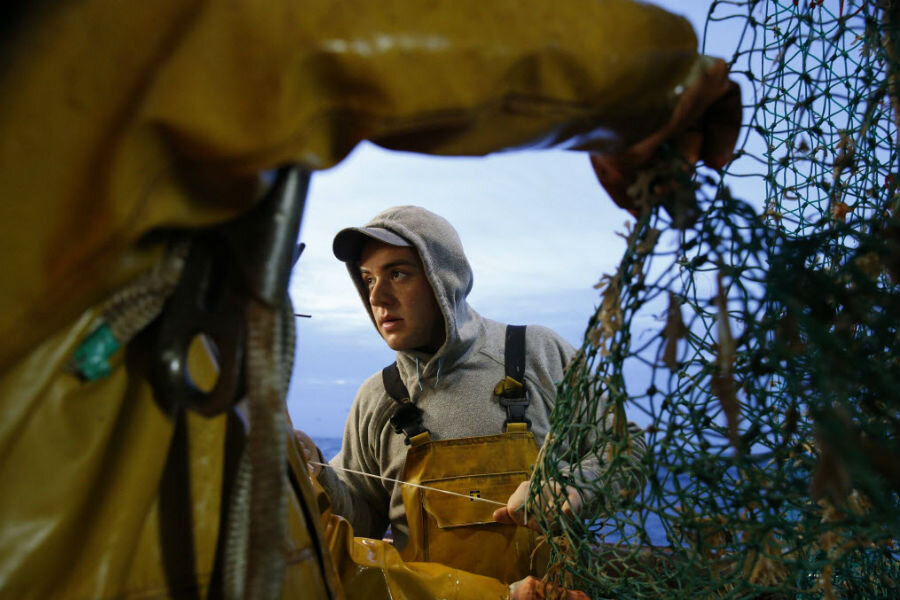Leonardo DiCaprio teams up with Google to track illegal fishing
Loading...
For decades, changing global temperatures, pollution, and overfishing have been harming the ocean's ecosystems around the world, and illegal fishing operations have made these problems even worse. But tracking down illegal fishing boats is difficult and time-consuming, allowing many illicit fishing vessels to slip the net of the law.
But now, it seems that the days of illegal fishers escaping justice may be numbered.
A new online program called the Global Fishing Watch, backed by Google and the Leonardo DiCaprio Foundation, allows users all over the world to identify and track illegal fishing operations in unprecedented detail, making it considerably harder to get away with illegal fishing in the world's oceans.
"Today, this unprecedented technology is available to everyone in the world. I encourage everyone to go check it out," said actor Leonardo DiCaprio at a conference Thursday, according to a press release from the US State Department. "This platform will empower citizens across the globe to become powerful advocates for our oceans."
The movie star's foundation contributed $6 million of the overall $10.3 million required to get the Global Fishing Watch up and running. DiCaprio's foundation collaborated with marine-advocacy group Oceana and West Virginia-based nonprofit SkyTruth, spending four years developing the technology to create a site that allows any registered user to track the movements of more than 35,000 commercial fishing vessels in close to real time, using Google satellite data. While the site was opened to the public only a few days ago, users are also able to access data going back to 2012, according to The Washington Post.
"Global Fishing Watch will revolutionize the way the world views commercial fishing," said Jacqueline Savitz, vice president for the United States and Global Fishing Watch at Oceana in a press release. “Now, in the hands of everyone, this free tool can be used by governments, journalists, citizens, researchers and the seafood industry. It will allow governments to track suspicious vessels, enforce rules and reduce seafood fraud. Journalists and everyday citizens will be able to identify behavior that may be related to illegal fishing or overfishing."
According to the Food and Agriculture Organization of the United Nations, illegal and unreported fishing is estimated to cost legitimate fishing operations to between $10 billion and $23.5 billion annually. This would account for between 11 million and 26 million tons of fish. That is to say nothing of the ecological impact of illegal fishing, which often results in the netting of endangered species, both intentionally and not. Many illegal fishers will also target already overfished populations, stalling recovery of many species in areas that depend on fish as a staple part of their diets.
The Global Fishing Watch can easily spot when a fishing boat wanders into waters where it's not supposed to be, thanks to data from Automatic Identification Systems (AIS) installed on most ships. But one key advantage to the new technology is the ability to identify suspicious patterns when a boat "goes dark" by turning off its AIS. During one incident in January, a fishing boat with a deactivated AIS was spotted using satellite data provided by Google moving in a fishing-like pattern in waters where fishing was not allowed. According to the Global Fishing Watch blog, the satellite images led to the apprehension of the boat along with its large, illegal cargo of sharks and shark fins.
As users engage with the new site, the algorithms that identify this sort of illegal behavior will be increasingly refined, allowing for the identifying and tracking of illegal fishing vessels more quickly and efficiently than ever before, according to The New York Times. These algorithms will be supplemented by members of the public, insurance companies, and governments with an interest in reining in shady practices on the sea.
Illegal fishing has historically been a large enough industry to make it difficult for countries to spend what would be required to stop it, particularly in the waters surrounding developing countries with limited resources to track down and apprehend illegal fishing vessels.
"We have to find a way to enforce [fishing laws]. We have to find a way to monitor it. And that’s very difficult in vast oceans with resources that are [limited]," Secretary of State John F. Kerry told the Post. "We’re trying to create accountability where there is very little. You can’t have impunity on this and expect to win this battle."







